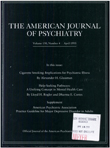Correlates of psychiatric distress among wives of hemophilic men with and without HIV infection
Abstract
OBJECTIVE: The authors' objectives were 1) to examine symptoms of depression, anxiety, and anger-hostility among the wives of men with hemophilia, a major risk group for AIDS, and 2) to identify psychosocial characteristics of the women and/or their husbands that were associated with elevated distress in the women. METHOD: Thirty-six women married to men with hemophilia were studied; the husbands of 17 of these women were HIV-seropositive. The men were drawn from the population of adults with hemophilia residing in a 24-county region of western Pennsylvania. Measures of wives' psychiatric symptoms were obtained, as were measures in three psychosocial domains: predispositional sociodemographic characteristics, psychosocial stressors, and husbands' strategies for coping. RESULTS: The psychiatric symptoms of the women did not differ as a function of their husbands' serostatus or across subgroups defined according to stages of HIV infection or clinical severity of hemophilia. Instead, other factors--perceptions of personal risk of AIDS, husbands' use of particular coping styles with respect to HIV infection, and the experience of other life events--were the principal correlates of psychiatric distress. CONCLUSIONS: HIV infection acted primarily as an indirect source of stress for these women, mediated by other psychosocial characteristics of both the women and their HIV- seropositive husbands. Mental health interventions for caregivers of HIV-seropositive individuals should target the identified psychosocial correlates of psychiatric distress.
Access content
To read the fulltext, please use one of the options below to sign in or purchase access.- Personal login
- Institutional Login
- Sign in via OpenAthens
- Register for access
-
Please login/register if you wish to pair your device and check access availability.
Not a subscriber?
PsychiatryOnline subscription options offer access to the DSM-5 library, books, journals, CME, and patient resources. This all-in-one virtual library provides psychiatrists and mental health professionals with key resources for diagnosis, treatment, research, and professional development.
Need more help? PsychiatryOnline Customer Service may be reached by emailing [email protected] or by calling 800-368-5777 (in the U.S.) or 703-907-7322 (outside the U.S.).



